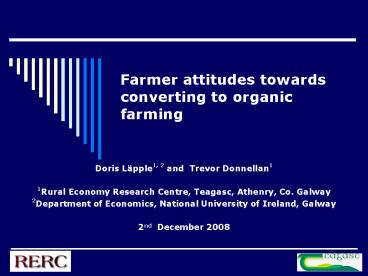Farmer attitudes towards converting to organic farming - PowerPoint PPT Presentation
1 / 13
Title:
Farmer attitudes towards converting to organic farming
Description:
understand why farmers make decisions in favour or against organic farming ... Intention to convert to organic farming within the next five years is low ... – PowerPoint PPT presentation
Number of Views:79
Avg rating:3.0/5.0
Title: Farmer attitudes towards converting to organic farming
1
Farmer attitudes towards converting to organic
farming
- Doris Läpple1, 2 and Trevor Donnellan1
- 1Rural Economy Research Centre, Teagasc, Athenry,
Co. Galway - 2Department of Economics, National University of
Ireland, Galway - 2nd December 2008
2
Overview of presentation
- Main objective and context
- Methodology
- Results
- Conclusion
3
Main objective
- Organic sector in Ireland is just over 1 of UAA
- (about 1,400 organic farms)
- ? government target 5 of UAA by 2012
- Why are more farmers not converting?
- Examine role that attitudes play and identify
drivers barriers to the intention to convert to
organic farming - ? understand why farmers make decisions in favour
or against organic farming
4
Context for this study
- Part of larger study
- Todays presentation is just a snapshot
- Only beginning detailed analysis at this point
- Survey of organic, ex-organic and conventional
farmers - Explain the decision to adopt or not to adopt
organic farming over time with respect to a
variety of factors - e.g. economic, structural, socio-economic
- To compare groups and identify problems to
provide a basis for improved policy intervention - ?Focus today intention to convert of
conventional farmers
context
5
Methodology Survey design and sample
- Preliminary work in advance of the survey
- 50 personal interviews
- farmers farm advisers
- Elicit true opinion of farmers about organic
farming - advantages/disadvantages, perceived problems,
influence of others - ? All statements are based on farmers beliefs
- Survey
- Structured questionnaire
- Sample size 181 conventional drystock farmers
- Collected through Teagasc National Farm Survey
Dept
methodology
6
Methodology Theory of planned behaviour
- receive higher prices
- Increase farm income
Attitude towards the behaviour
Intention to perform behaviour
- Family
- Farm advisers
- Other farmers
Subjective norm social influence
Behaviour
Producing organic meat on own farm within the
next five years
- Suitable farm conditions
- farming without using fertilizer
Perceived behavioural control
Identify influences on the intention to convert
using statistical methods
7
ResultsIntention to convert
- Intention to convert to organic farming within
the next five years is low - mean 1.9, measured from 1 to 5
- Almost 75 of farmers scored a 1 or a 2
- Indicating a very low or a low intention to
convert - 6 of farmers scored a 4 or a 5
- Indicating considerable interest in going organic
results
8
Results Attitudes- drivers and barriers of
adoption
- Neutral attitude towards conversion
- mean -0.09, measured from -2 to 2
- ? in general farmers do not have a bad
perception about organic farming - Drivers
- increasing farm income due to higher support
payments - receiving higher prices
- ? financial incentives
- Barriers
- Farmers perception of producing a product only
rich people can afford - ? Correlation coefficients show that the negative
influence of this barrier dominates the
positive influence of the drivers
results
9
Results influence of others
- Farmers do not receive positive feedback from
others - mean -0.52, measured from -2 to 2
- Influence of other people or information sources
- None of these groups encourage farmers to convert
- Family
- Other farmers
- ? Most negative influence on conversion
- Correlation coefficients show strongest influence
on the intention to convert of - the farming press
- farm advisers
- ?But not a positive influence
results
10
Results perceived problems
- Farmers have a negative view of their possibility
to convert the farm and doubt their own technical
ability - mean -0.24, measured from -2 to 2
- Concern about
- Maintaining animal health based on prevention
- mean -0.61, measured from -2 to 2
- Uncertainty about
- Own knowledge and skills about farming
organically - mean 0.24, measured from -2 to 2
- Time/labour involved in organic farming
- mean0.17, measured from -2 to 2
results
11
Conclusiontake home message
- 75 of conventional drystock farmers express low
or very low intention to convert - What do conventional drystock farmers think about
organics? - In general they themselves dont have strong
opinions about organic farming - But they perceive that others have a negative
opinion - They tend to lack confidence about the
possibility of converting the farm their own
technical ability to go organic
12
ConclusionMessage for policy makers
- What can be done to increase the size of the
sector? - Continuing promotion of organic farming as a
profitable alternative to conventional farming - uptake most likely to be financially driven
- Raise level of knowledge of farmers about how to
farm organically demonstrate that conversion is
possible - the farming press farm advisers
- Change perception of farmers that only rich
people can afford to buy organic products - information campaign that demonstrates to farmers
that organics are consumed by a broader
demographic
conclusion
13
- Thanks for your attention































